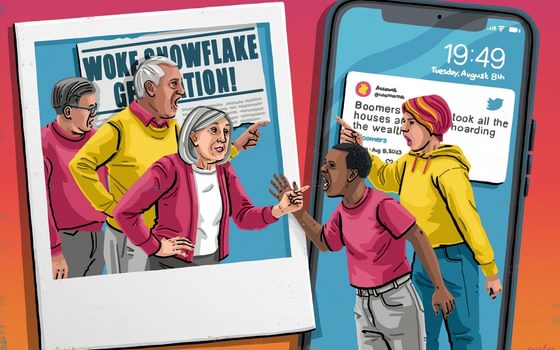Childcare for every generation
Children, parents and grandparents are all suffering because of our broken childcare system. So what needs to change and how we can learn from childcare activists of the past?
05 September 2023
This is an article from the sixth issue of the New Economics Zine. You can find the full issue here.
Childcare is having a political moment. Following the Spring Budget, which centered childcare as a key issue, it’s looking likely that the Early Years will feature heavily in the debate in the run up to the next general election — and rightly so. Families in the UK face some of the highest childcare costs in the world, while childcare workers are leaving the sector in their thousands. Despite childcare commonly being thought of as a problem for parents, the UK’s childcare crisis is permeating every generation — hitting parents with rocketing childcare costs, grandparents who are increasingly relied upon for unpaid care, childcare workers struggling on low wages, and of course children themselves.
As someone who has spent their entire adult life thinking about (and performing) paid care labour, it has been a welcome change to see childcare and early years education at the forefront of political debate. But while childcare has been a longstanding feminist issue, mainstream childcare activism is often led by its service-users rather than its workers.This shapes the framing of the most influential childcare campaigns in ways that feel unimaginative at best and actively hostile towards the workforce at worst.The common narrative of childcare as a solution to ‘get women back into the workplace’ — primarily through increasing childcare subsidy — feels depressingly narrow in its scope. This is especially true when you consider the exciting, radical alternatives we’ve seen in the past.
Historically, childcare was provided for women who were seen as ‘in need’ — those on low-incomes, known to social services, or if their children had special educational needs or a disability. Yet today we see the reverse: only one in five children in the households from the bottom third of earnings in the UK are eligible for a funded nursery place, and the stringent eligibility criteria for families accessing funded places excludes migrant parents with No Recourse to Public Funds (NRPF) and students. Childcare is, increasingly, only for those who can afford it.The dominant narrative of childcare being important because it allows for parents’ increased economic participation, while certainly speaking to a certain truth (that parents — particularly mothers―face barriers to work that are gendered), fails to capture the breadth and complexity of care’s role in our society. So why, when we are finally being given the airtime to talk about overhauling childcare, are our demands so limited?
“We need to think outside of the bounds set by neoliberalism and start talking about radical solutions: childcare as a universal basic service…”
We need to think outside of the bounds set by neoliberalism and start talking about radical solutions: childcare as a universal basic service — free at the point of access, or early years as non-negotiable education for under-fives, as opposed to something that helps parents ‘contribute’ to society by going back to work.
After all, the childcare crisis is not new: others have historically fought for better care with varying success, and a great deal of them are still around today, eager to share their stories. Cross-generational solidarity could provide the community, framework, and political allyship required to demand the solutions we need by helping us to understand what has come before.
Grow Your Own — an oral history project run by OnTheRecord, posits exactly this. The project examines whether sharing the history of childcare activism across four boroughs of East London (Tower Hamlets, Newham, Hackney, Waltham Forest) can support those affected by childcare issues today. The project has several outputs including a user-generated digital map which will document past and present childcare actions across East London, an interactive events series, and a podcast series launching at the end of Summer 2023. Crucially, it is also providing space for past and present childcare activists to come together for regular ‘Critical Friends’ sessions, where they can share their experiences of childcare organising and support one another to look to the past for future solutions. All of the older participants in the sessions have extensive activist experience, from building some of the first cooperative nurseries in London to leading campaigns like the National Childcare Campaign (now Coram Family & Childcare) to occupying squats in order to set up holiday clubs for mothers without access to other forms of care. Their experiences can help us realise what is possible.
Perhaps the best example of this kind of cross-generational solidarity in action is Stone Soup Group, a nascent parent-led cooperative crèche in Walthamstow, inspired by the First Neighbourhood Cooperative Nursery established in the same borough fifty years prior. Organisers from First Neighbourhood, now in their seventies and eighties, met up with Stone Soup in its infancy to lend support. Speaking to Angela, one of the group’s organisers, she tells me that ‘They were really supportive… they identified some really big challenges and things that they learned with hindsight, so were able to give key recommendations…. like agreeing things beforehand and giving training…It’s so helpful that you’re not making things up as you go’. The group also runs an ‘intergenerational project’: ‘We know that many older people living in Walthamstow , are lonely […] this type of interaction can decrease older people’s loneliness, delay mental decline, lower blood pressure and even reduce the risk of disease. The benefit of almost any interaction between young and old is self-evident’.
“On a broader scale, many of the issues plaguing the social care sector — financialisation, low wages, long hours, high costs — mirror those in the childcare sector.”
On a broader scale, many of the issues plaguing the social care sector — financialisation, low wages, long hours, high costs — mirror those in the childcare sector. Bringing social care and childcare together in campaign efforts could help strengthen both movements: pensioners make for powerful political allies, and many of them are additionally aware of the childcare crisis in its current iteration. Grandparents are being relied upon more and more to plug childcare gaps, and digital platforms, such as Koru Kids and GrandNannies, have gone one step further to advertise for ‘Grannies’ as childcare workers, hinting perhaps at the near-third of pensioners living in poverty. When we limit childcare framing to a problem of gender inequity, we lose the nuance of care as something that permeates all stages of the lifespan and risk, and impede ourselves from building an argument for quality care as a fundamental necessity as opposed to a political football.
Care is something we will all need, or do, at one point or another in our lives, and tying the value of care to its ability to create and retain jobs limits us in terms of how we conceptualise its role in our society more broadly. Many are already coming together across generations to share, learn, and organise, making it clear that from community projects to care homes to the ballot box, cross-generational solidarity could hold the key to building demands that stick.
Veronica Deutsch is a freelance researcher and community organiser who previously worked in the childcare sector and co-founded the Nanny Solidarity Network.
Image: Eva Bee
Topics Zine






